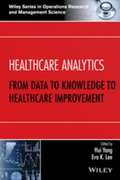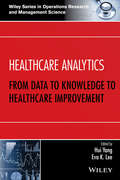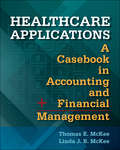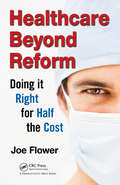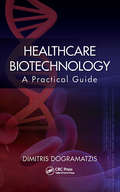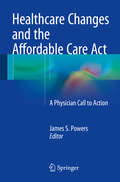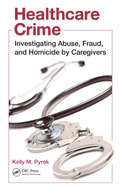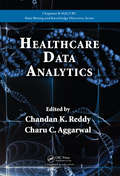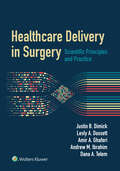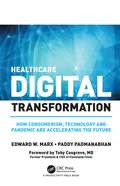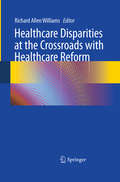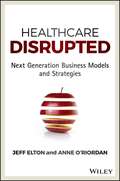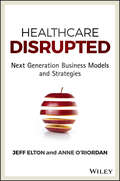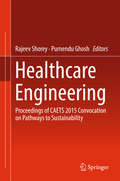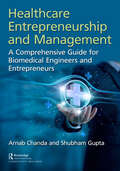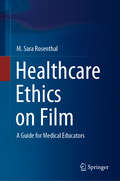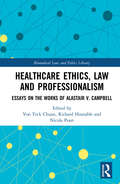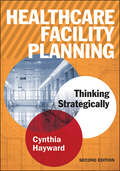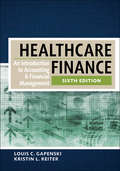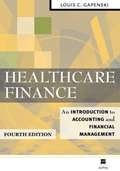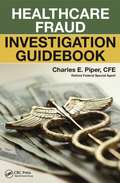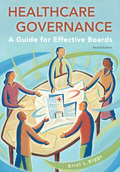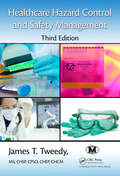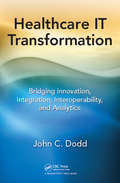- Table View
- List View
Healthcare Analytics: From Data to Knowledge to Healthcare Improvement
by Hui Yang Eva K. LeeFeatures of statistical and operational research methods and tools being used to improve the healthcare industry With a focus on cutting-edge approaches to the quickly growing field of healthcare, Healthcare Analytics: From Data to Knowledge to Healthcare Improvement provides an integrated and comprehensive treatment on recent research advancements in data-driven healthcare analytics in an effort to provide more personalized and smarter healthcare services. Emphasizing data and healthcare analytics from an operational management and statistical perspective, the book details how analytical methods and tools can be utilized to enhance healthcare quality and operational efficiency. Organized into two main sections, Part I features biomedical and health informatics and specifically addresses the analytics of genomic and proteomic data; physiological signals from patient-monitoring systems; data uncertainty in clinical laboratory tests; predictive modeling; disease modeling for sepsis; and the design of cyber infrastructures for early prediction of epidemic events. Part II focuses on healthcare delivery systems, including system advances for transforming clinic workflow and patient care; macro analysis of patient flow distribution; intensive care units; primary care; demand and resource allocation; mathematical models for predicting patient readmission and postoperative outcome; physician-patient interactions; insurance claims; and the role of social media in healthcare. Healthcare Analytics: From Data to Knowledge to Healthcare Improvement also features: * Contributions from well-known international experts who shed light on new approaches in this growing area * Discussions on contemporary methods and techniques to address the handling of rich and large-scale healthcare data as well as the overall optimization of healthcare system operations * Numerous real-world examples and case studies that emphasize the vast potential of statistical and operational research tools and techniques to address the big data environment within the healthcare industry * Plentiful applications that showcase analytical methods and tools tailored for successful healthcare systems modeling and improvement The book is an ideal reference for academics and practitioners in operations research, management science, applied mathematics, statistics, business, industrial and systems engineering, healthcare systems, and economics. Healthcare Analytics: From Data to Knowledge to Healthcare Improvement is also appropriate for graduate-level courses typically offered within operations research, industrial engineering, business, and public health departments. HUI YANG, PhD, is Associate Professor in the Harold and Inge Marcus Department of Industrial and Manufacturing Engineering at The Pennsylvania State University. His research interests include sensor-based modeling and analysis of complex systems for process monitoring/control; system diagnostics/ prognostics; quality improvement; and performance optimization with special focus on nonlinear stochastic dynamics and the resulting chaotic, recurrence, self-organizing behaviors. EVA K. LEE, PhD, is Professor in the H. Milton Stewart School of Industrial and Systems Engineering at the Georgia Institute of Technology, Director of the Center for Operations Research in Medicine and HealthCare, and Distinguished Scholar in Health System, Health Systems Institute at both Emory University School of Medicine and Georgia Institute of Technology. Her research interests include health-risk prediction; early disease prediction and diagnosis; optimal treatment strategies and drug delivery; healthcare outcome analysis and treatment prediction; public health and medical preparedness; large-scale healthcare/medical decision analysis and quality improvement; clinical translational
Healthcare Analytics: From Data to Knowledge to Healthcare Improvement (Wiley Series in Operations Research and Management Science)
by Hui Yang Eva K. LeeFeatures of statistical and operational research methods and tools being used to improve the healthcare industry With a focus on cutting-edge approaches to the quickly growing field of healthcare, Healthcare Analytics: From Data to Knowledge to Healthcare Improvement provides an integrated and comprehensive treatment on recent research advancements in data-driven healthcare analytics in an effort to provide more personalized and smarter healthcare services. Emphasizing data and healthcare analytics from an operational management and statistical perspective, the book details how analytical methods and tools can be utilized to enhance healthcare quality and operational efficiency. Organized into two main sections, Part I features biomedical and health informatics and specifically addresses the analytics of genomic and proteomic data; physiological signals from patient-monitoring systems; data uncertainty in clinical laboratory tests; predictive modeling; disease modeling for sepsis; and the design of cyber infrastructures for early prediction of epidemic events. Part II focuses on healthcare delivery systems, including system advances for transforming clinic workflow and patient care; macro analysis of patient flow distribution; intensive care units; primary care; demand and resource allocation; mathematical models for predicting patient readmission and postoperative outcome; physician–patient interactions; insurance claims; and the role of social media in healthcare. Healthcare Analytics: From Data to Knowledge to Healthcare Improvement also features: • Contributions from well-known international experts who shed light on new approaches in this growing area • Discussions on contemporary methods and techniques to address the handling of rich and large-scale healthcare data as well as the overall optimization of healthcare system operations • Numerous real-world examples and case studies that emphasize the vast potential of statistical and operational research tools and techniques to address the big data environment within the healthcare industry • Plentiful applications that showcase analytical methods and tools tailored for successful healthcare systems modeling and improvement The book is an ideal reference for academics and practitioners in operations research, management science, applied mathematics, statistics, business, industrial and systems engineering, healthcare systems, and economics. Healthcare Analytics: From Data to Knowledge to Healthcare Improvement is also appropriate for graduate-level courses typically offered within operations research, industrial engineering, business, and public health departments.
Healthcare Applications: A Casebook in Accounting and Financial Management (AUPHA/HAP Book)
by Thomas McKeeInstructor Resources: Suggested case solutions (Word or Excel formats) Financial issues are of paramount importance in today’s rapidly changing and increasingly competitive healthcare environment. Healthcare managers must understand accounting and financial management concepts and be prepared to operationalize them in their organizations. Healthcare Applications: A Casebook in Accounting and Financial Management provides a series of practice exercises for analyzing, understanding, and applying these concepts across a wide range of healthcare settings. Healthcare Applications contains 56 short cases designed to link theory to practical, real-world application via active learning. Based on fictitious entities and individuals (unless otherwise noted), the cases cover basic concepts—such as how to record transactions, compute financial ratios, and prepare financial statements—as well as more advanced issues, such as the effects of healthcare regulation, the valuation of debt or equity securities, cost–volume–profit analysis, and capital budgeting. Each case features assignments or questions to enhance students’ critical thinking and generate classroom engagement. Instructors can select case topics and difficulty levels that are most appropriate for their courses. The book’s cases can be either assigned as out-of-class homework or used directly in class to introduce a topic or facilitate discussion.
Healthcare Beyond Reform: Doing It Right for Half the Cost
by Joe FlowerThere is a secret inside healthcare, and it‘s this: We can do healthcare for a lot less money. The only way to do that is to do it a lot better. We know it‘s possible because it is happening now. In pockets and branches across healthcare, people are receiving better healthcare for a lot less. Some employers, states, tribes, and health systems are d
Healthcare Biotechnology: A Practical Guide
by Dimitris DogramatzisForeseeing and planning for all of the possibilities and pitfalls involved in bringing a biotechnology innovation from inception to widespread therapeutic use takes strong managerial skills and a solid grounding in biopharmaceutical research and development procedures. Unfortunately there has been a dearth of resources for this aspect of the field.
Healthcare Changes and the Affordable Care Act
by James S. PowersHealthcare Changes Reach Main Street: A Call to Action for Physicians provides guidance, examples, and information on processes and time lines for physicians based on the implementation of The Affordable Care Act (ACA) that was established in 2010. This volume focuses on how geriatricians and other healthcare professionals can be engaged in responding to the roll-out of the ACA in their communities, and through this engagement assume leadership roles in local hospitals, healthcare organizations, and medical societies to advance quality improvement and new models of care for older adults. In-depth chapters provide an update on quality improvement efforts at the state level, as well as changes in Medicaid financing and the significant impact this will have for older adults, particularly dual-eligibles. Many elements of the ACA are yet to be rolled out and many healthcare decisions are yet to be made. Healthcare Changes Reach Main Street: A Call to Action for Physicians will guide healthcare decision makers and help them to play a leadership role in advancing quality care for older adults in our changing healthcare environment.
Healthcare Crime: Investigating Abuse, Fraud, and Homicide by Caregivers
by Kelly M. PyrekCrime perpetrated by healthcare professionals is increasingly pervasive in today‘s hospitals and other healthcare settings. Patients, coworkers, and employers are vulnerable to exploitation, fraud, abuse, and even murder. Investigative journalist Kelly M. Pyrek interviews experts who provide accounts concerning the range of criminality lurking in t
Healthcare Data Analytics (Chapman & Hall/CRC Data Mining and Knowledge Discovery Series)
by Charu C. Aggarwal Chandan K. ReddyAt the intersection of computer science and healthcare, data analytics has emerged as a promising tool for solving problems across many healthcare-related disciplines. Supplying a comprehensive overview of recent healthcare analytics research, Healthcare Data Analytics provides a clear understanding of the analytical techniques currently available
Healthcare Decision-Making and the Law
by Mary DonnellyThis analysis of the law's approach to healthcare decision-making critiques its liberal foundations in respect of three categories of people: adults with capacity, adults without capacity and adults who are subject to mental health legislation. Focussing primarily on the law in England and Wales, the analysis also draws on the law in the United States, legal positions in Australia, Canada, Ireland, New Zealand and Scotland and on the human rights protections provided by the ECHR and the Convention on the Rights of Persons with Disabilities. Having identified the limitations of a legal view of autonomy as primarily a principle of non-interference, Mary Donnelly questions the effectiveness of capacity as a gatekeeper for the right of autonomy and advocates both an increased role for human rights in developing the conceptual basis for the law and the grounding of future legal developments in a close empirical interrogation of the law in practice.
Healthcare Delivery in Surgery: Scientific Principles and Practice
by Justin B Dimick Lesly A Dossett Amir A Ghaferi Andrew M IbrahimAn invaluable resource for surgeons, surgical leaders, and health system administrators at all levels, Healthcare Delivery in Surgery: Scientific Principles and Practice provides unique, expert coverage of common challenges in the delivery of surgical care. Editor Justin B. Dimick, MD, MPH, Chair of the University of Michigan’s Department of Surgery, leads an outstanding editorial team from the UM Center for Healthcare Outcomes and Policy who provide clear guidance on the strategy and operations of delivering optimal surgical care. Using a case-based approach, authors consider the underlying principles and existing evidence followed by real-world practical solutions.
Healthcare Digital Transformation: How Consumerism, Technology and Pandemic are Accelerating the Future (HIMSS Book Series)
by Edward W. Marx Paddy PadmanabhanThis book is a reference guide for healthcare executives and technology providers involved in the ongoing digital transformation of the healthcare sector. The book focuses specifically on the challenges and opportunities for health systems in their journey toward a digital future. It draws from proprietary research and public information, along with interviews with over one hundred and fifty executives in leading health systems such as Cleveland Clinic, Partners, Mayo, Kaiser, and Intermountain as well as numerous technology and retail providers. The authors explore the important role of technology and that of EHR systems, digital health innovators, and big tech firms in the ongoing digital transformation of healthcare. Importantly, the book draws on the accelerated learnings of the healthcare sector during the COVID-19 pandemic in their digital transformation efforts to adopt telehealth and virtual care models. Features of this book: Provides an understanding of the current state of digital transformation and the factors influencing the ongoing transformation of the healthcare sector. Includes interviews with executives from leading health systems. Describes the important role of emerging technologies; EHR systems, digital health innovators, and more. Includes case studies from innovative health organizations. Provides a set of templates and frameworks for developing and implementing a digital roadmap. Based on best practices from real-life examples, the book is a guidebook that provides a set of templates and frameworks for digital transformation practitioners in healthcare.
Healthcare Disparities at the Crossroads with Healthcare Reform
by Richard Allen WilliamsBuilding upon the success of Dr. Williams's widely influential book Eliminating Healthcare Disparities in America: Beyond the IOM Report, this new volume takes a fresh and timely look at the state of healthcare reform and the progress and problems we face in the pursuit of healthcare equality. This book focuses on how the elimination of disparities can be accomplished through targeted efforts made within the context of reform. Comprising the combined efforts of the nation's best health policy analysts, researchers, key opinion leaders and clinicians, this book addresses both current and impending legislation and future movements in healthcare. With the knowledge that the problem of disparities extends beyond the present political arena into the larger scope of all aspects of healthcare delivery, the authors provide critical analysis of the causation of disparities, insightful examples of what has worked, and a striking call to action with implementable strategies for advancing equality.
Healthcare Disrupted: Next Generation Business Models and Strategies
by Anne O'Riordan Jeff Elton<p>Healthcare Disrupted is an in-depth look at the disruptive forces driving change in the the healthcare industry and provides guide for defining new operating and business models in response to these profound changes. <p>Based on original research conducted by Accenture and years of experience working with the most successful companies in the industry, healthcare experts Jeff Elton and Anne O’Riordan provide an informed, insightful view of the state of the industry, what's to come, and new emerging business models for life sciences companies play a different role from the past in to driving superior outcomes for patients and playing a bigger role in creating greater value for healthcare overall. Their book explains how critical global healthcare trends are challenging legacy strategies and business models, and examines why historical leaders in the industy must evolve, to stay relevant and compete with new entrants. <p>Healthcare Disrupted captures this pivotal point in time to give executives and senior managers across pharmaceutical, biopharmaceutical, medical device, medical diagnostics, digital technology, and health services companies an opportunity to step back and consider the changing landscape. This book gives companies options for how to adapt and stay relevant and outlines four new business models that can drive sustainable growth and performance. It demonstrates how real-world data (from Electronic Medical Records, health wearables, Internet of Things, digital media, social media, and other sources) is combining with scalable technologies and advanced analytics to fundamentally change how and where healthcare is delivered, bridging to the health of populations, and broadening the resposibility for both. It reveals how this shift in healthcare delivery will significantly improve patient outcomes and the value health systems realize.</p>
Healthcare Disrupted: Next Generation Business Models and Strategies
by Anne O'Riordan Jeff Elton“During a time of tremendous change and uncertainty, Healthcare Disrupted gives executives a framework and language to determine how they will evolve their products, services, and strategies to flourish in a increasingly value-based healthcare system. Using a powerful mix of real world examples and unanswered questions, Elton and O’Riordan lead you to see that ‘no action’ is not an option—and push you to answer the most important question: ‘What is your role in this digitally driven change and how can your firm can gain competitive advantage and lead?’”—David Epstein, Division Head, Novartis Pharmaceuticals “Healthcare Disrupted is an inspirational call-to-action for everyone associated with healthcare, especially the innovators who will develop the next generation of therapeutics, diagnostics, and devices.”—Bob Horvitz, Ph.D., David H. Koch Professor of Biology, MIT; Nobel Prize in Physiology or Medicine “In a time of dizzying change across all fronts: from biology, to delivery, to the use of big data, Health Disrupted captures the impact of these forces and thoughtfully develops new approaches to value creation in the healthcare industry. A must-read for those who strive to capitalize on change and reinvent the industry.”—Deborah Dunsire, M.D., president and CEO, FORUM Pharmaceuticals Healthcare at a Crossroad: Seismic Shifts, New Business Models for Success Healthcare Disrupted is an in-depth look at the disruptive forces driving change in the the healthcare industry and provides guide for defining new operating and business models in response to these profound changes. Based on original research conducted by Accenture and years of experience working with the most successful companies in the industry, healthcare experts Jeff Elton and Anne O’Riordan provide an informed, insightful view of the state of the industry, what's to come, and new emerging business models for life sciences companies play a different role from the past in to driving superior outcomes for patients and playing a bigger role in creating greater value for healthcare overall. Their book explains how critical global healthcare trends are challenging legacy strategies and business models, and examines why historical leaders in the industy must evolve, to stay relevant and compete with new entrants. Healthcare Disrupted captures this pivotal point in time to give executives and senior managers across pharmaceutical, biopharmaceutical, medical device, medical diagnostics, digital technology, and health services companies an opportunity to step back and consider the changing landscape. This book gives companies options for how to adapt and stay relevant and outlines four new business models that can drive sustainable growth and performance. It demonstrates how real-world data (from Electronic Medical Records, health wearables, Internet of Things, digital media, social media, and other sources) is combining with scalable technologies and advanced analytics to fundamentally change how and where healthcare is delivered, bridging to the health of populations, and broadening the resposibility for both. It reveals how this shift in healthcare delivery will significantly improve patient outcomes and the value health systems realize.
Healthcare Engineering
by Purnendu Ghosh Rajeev ShoreyThe book contains the proceedings of CAETS 2015 Convocation on 'Pathways to Sustainability: Energy, Mobility and Healthcare Engineering' that was held on October 13-14, 2015 in New Delhi. This 3 volume proceedings provide an international forum for discussion and communication of engineering and technological issues of common concern. This volume talks about 'Healthcare' and includes 11 chapters on diverse topics like regenerative engineering, big data analytics in healthcare, molecular science, rising expenditure on health issues, adoption of personalized medicine, etc. The contents of this volume will be useful to researchers and healthcare professionals.
Healthcare Entrepreneurship and Management: A Comprehensive Guide for Biomedical Engineers and Entrepreneurs
by Arnab Chanda Shubham GuptaPost pandemic, the world is not the same place. There has been an increasing focus on healthcare and well-being, which has created a once-in-a-lifetime opportunity for healthcare innovations and startups. From adoption of a range of medical apps and telemedicine technologies to heightened public interest in smart wearables and medical devices, the demand for efficient healthcare delivery has been skyrocketing. This book aims to serve as a first-of-its-kind guide for skill development in conception to commercialisation of healthcare products and services. It covers the gamut from the study of healthcare challenges, such as understanding customer requirements, market needs, and competition, to the various steps of the healthcare product development process, such as defining value propositions and specifications, the creation of minimum viable product (MVP) to prototyping, and manufacturing. The authors also discuss key commercialisation and management strategies, including the development of a robust business plan, fund raising, intellectual property, creating barriers to entry, and launching healthcare startups. Medical product pricing, positioning, sales and distribution, and customer acquisition are also presented with real-life examples. This book serves as a key reference not only for biomedical engineers who are looking to launch their products or services in the market but also for budding entrepreneurs willing to explore opportunities in the healthcare domain. For example, engineers and managers working on the development of medical devices require knowledge of ethical guidelines, regulations, and approvals to effectively launch their products in the medtech industry. On the other hand, entrepreneurs looking to benefit from the booming healthcare industry will find this book helpful in understanding the fundamentals of medical product development and commercialisation to launch their ideas successfully.
Healthcare Ethics on Film: A Guide for Medical Educators
by M. Sara RosenthalThis book is a companion to Clinical Ethics on Film and deals specifically with the myriad of healthcare ethics dilemmas. While Clinical Ethics on Film focuses on bedside ethics dilemmas that affect the healthcare provider-patient relationship, Healthcare Ethics on Film provides a wider lens on ethics dilemmas that interfere with healthcare delivery, such as healthcare access, discrimination, organizational ethics, or resource allocation. The book features detailed and comprehensive chapters on the Tuskegee Study, AIDS, medical assistance in dying, the U.S. healthcare system, reproductive justice, transplant ethics, pandemic ethics and more. Healthcare Ethics on Film is the perfect tool for remote or live teaching. It’s designed for medical educators and healthcare professionals teaching any aspect of bioethics, healthcare ethics or the health sciences, including medical humanities, history of medicine and health law. It is also useful to the crossover market of film buffs and other readers involved in healthcare or bioethics.
Healthcare Ethics, Law and Professionalism: Essays on the Works of Alastair V. Campbell (Biomedical Law and Ethics Library)
by Richard Huxtable Voo Teck Chuan Nicola PeartHealthcare Ethics, Law and Professionalism: Essays on the Works of Alastair V. Campbell features 15 original essays on bioethics, and healthcare ethics specifically. The volume is in honour of Professor Alastair V. Campbell, who was the founding editor of the internationally renowned Journal of Medical Ethics, and the founding director of three internationally leading centres in bioethics, in Otago, New Zealand, Bristol, UK, and Singapore. Campbell was trained in theology and philosophy and throughout his career worked with colleagues from various disciplines, including law and various branches of healthcare. The diversity of topics and depth of contributors’ insights reflect the breadth and impact of Campbell’s philosophical work and policy contributions to healthcare ethics. Throughout his long academic career, Campbell’s emphasis on healthcare ethics being practice-oriented, yet driven by critical reflection, has shaped the field in vital ways. The chapters are authored by leading scholars in healthcare ethics and law. Directly engaging with Campbell’s work and influence, the essays discuss essential questions in healthcare ethics relating to its methodology and teaching, its intersection with law and policy, medical professionalism, religion, and its translation in different cultural settings. Chapters also grapple with specific enduring topics, such as the doctor-patient relationship, justice in health and biomedical research, and treatment of the human body and the dead.
Healthcare Facility Planning: Thinking Strategically, Second Edition (ACHE Management)
by Cynthia HaywardInstructor Resources: PowerPoint slides of the book’s exhibits. Spending millions of dollars to renovate, reconfigure, expand, or replace a facility can be intimidating without the right direction. Healthcare Facility Planning: Thinking Strategically, Second Edition, is a practical guide that will help healthcare executives move confidently from planning to implementation by deploying an integrated facility planning process, understanding the trends that affect space utilization and configuration, and planning flexible facilities. The book’s focus is on predesign planning—a stage of the healthcare facility planning, design, and construction process that is frequently overlooked as organizations eagerly jump from strategic planning into the more glamorous phase of design. Healthcare executives have the greatest opportunity to express a vision for their organization’s future during predesign planning, and decisions made during this stage have the greatest impact on long-term operational costs and future flexibility. Careful predesign planning allows an organization to rethink its current patient care delivery model, operational systems and processes, and use of technology to ensure a facility substantially benefits patients, caregivers, and payers. This new edition addresses current issues—new financial incentives, fluctuating utilization and demand, constant pressure for technology adoption and deployment, rising turf wars among specialists, intense focus on patient safety, and aging physical plants—that affect the way facilities are used, planned, financed, and built. Detailed examples, guidelines, and case studies, many new to this edition, lead the reader step-by-step through the facility planning process. This book’s planning process reveals how a new facility can improve operational efficiency, enhance customer satisfaction, and create new revenue streams, in addition to being aesthetically pleasing and well engineered. Highlights include: Deploying an integrated facility planning process tailored to an institution’s unique needs Understanding the trends that affect space allocation and configuration Defining strategic direction and future demand Coordinating operations improvement initiatives and planned technology investments with facility planning
Healthcare Finance: An Introduction to Accounting and Financial Management, Sixth Edition (AUPHA/HAP Book)
by Louis GapenskiBonus Chapters 18 & 19 (click here for access) Practice Exercises for Students (click here for access) Instructor Resources: Test bank, PowerPoint slides, solutions to end-of-chapter questions and problems, and a transition guide to the new edition. The essential concepts of both accounting and financial management are covered in this best-selling healthcare finance book. Through clear explanations, numerous examples, and realistic practice problems, it arms future managers with the grounding they need to make financially sound decisions for their healthcare organizations. This thoroughly updated edition provides more emphasis on the unique marketplace for healthcare services and additional examples from nonhospital settings, including medical practices, clinics, home health agencies, nursing homes, and managed care organizations. Particular content changes include: Expanded discussion of health insurance, reimbursement methodologies, and the impact of healthcare reform on provider behavior A new presentation of managerial accounting material that follows a more logical progression of concepts, emphasizing the level of analysis (organization, department, service) rather than techniques Coverage of three service-line costing methods: cost-to-charge ratio, relative value unit, and activity-based costing. Plus, an introduction to time-driven activity-based costing, a method for costing at the patient level. Updated financial accounting formats that conform to the latest American Institute of Certified Public Accountants guidance Increased coverage of the revenue cycle This edition also features a more user-friendly layout and additional end-of-chapter practice problems. Online student resources include: A chapter on lease financing and business valuation (previously included in the book) A chapter on distributions to owners: bonuses, dividends, and repurchases Use the companion casebook for even more classroom application!Gapenski's Cases in Healthcare Finance, Sixth Edition, is an ideal supplement to this text. Through real-world cases, it bridges the gap between learning concepts in a lecture setting and applying these concepts on the job. Students will be better prepared to deal with the multitude of issues that arise in the practice of healthcare finance!
Healthcare Finance: An Introduction to Accounting and Financial Management (Fourth Edition)
by Louis C. GapenskiLike its predecessors, this textbook teaches the reader the fundamental concepts of healthcare finance, including both financial management and accounting. The fourth edition features: New or expanded coverage of: Municipal bond pools, Cost of capital for not-for-profit and small businesses, Modified internal rate of return, Supply chain management , Health savings accounts, Current information on reimbursement, along with updated real-world examples, Easy-to-grasp spreadsheet illustrations of the calculations throughout the book Learning aids, including a glossary; self-test questions; and end-of-chapter key concepts, questions, and problems
Healthcare Fraud Investigation Guidebook
by Charles E. PiperSome have estimated that healthcare fraud in the United States results in losses of approximately $80 billion a year. Although there are many books available that describe how to detect healthcare fraud, few address what must be done after the fraud is detected. Filling this need, Charles Piper‘s Healthcare Fraud Investigation Guidebook details not only how to detect healthcare fraud, but also how to investigate and prove the wrongdoing to increase the likelihood of successful prosecution in court.The book starts by covering the history of healthcare insurance and the various types of fraud schemes. It presents Charles Piper‘s unique approach to investigating (The Piper Method) which allows readers to conduct as many as 10 simultaneous investigations for each case. It emphasizes the importance of simultaneously searching for waste and abuse as well as systemic weaknesses and deficiencies that caused or contributed to the problem or wrongdoing under investigation and then make recommendations for improvement. It also provides:Questions to ask whistleblowers, complainants, employers, employees, and healthcare providers who are suspectsTips on investigative case planning, goals, and strategiesSample visual aids for use when briefing others about your investigative findingsGuidance on presenting information obtained from healthcare investigations and on how to testify in courtTechniques for uncovering previously undetected fraudThe book includes a sample case study that walks readers through a mock case from the time the case is received through the end. The case study demonstrates how to initiate, plan, and conduct a thorough and complete healthcare fraud investigation while incorporating Piper‘s proven methodology.Sharing insights gained through Charles Piper‘s decades o
Healthcare Governance: A Guide For Effective Boards (ACHE Management)
by Errol BiggsHospital and health system board members face increasing challenges, with healthcare reform and other laws demanding improved accountability and efficiency. This handbook reveals the secrets of effective board structure and function, including responsibilities of board members, term limits, recruiting new members, and working with the CEO. Other aspects of a board’s work, including monitoring quality, providing financial oversight, and completing a self-assessment process, are also covered. Sample forms and documents, a glossary of common healthcare terms, and a conflict of interest policy are included. Board members, regardless of their expertise, will find this handbook easy to navigate.
Healthcare Hazard Control and Safety Management
by James T. TweedyComprehensive in scope, this totally revamped edition of a bestseller is the ideal desk reference for anyone tasked with hazard control and safety management in the healthcare industry. Presented in an easy-to-read format, Healthcare Hazard Control and Safety Management, Third Edition examines hazard control and safety management as proactive funct
Healthcare IT Transformation: Bridging Innovation, Integration, Interoperability, and Analytics
by John C. DoddThis book gives examples from healthcare institutions that are using IT automation and innovation to drive change and provides guidance on the strategic direction of HIT over the next five years. Improving the delivery of healthcare through HIT is vital for both the economic success of healthcare organizations and the care of the patient, but most EMR systems do not have an integrated and architected approach. This book provides a detailed approach on how to leverage IT for transformation. It also shows how to build upon the experiences of other industries and helps foster innovation by providing a vision of where technology can be an enabler.
